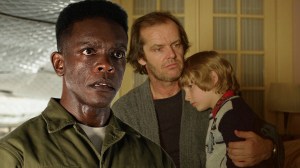Few cultures offer as compelling of stories as Norse mythology, which have been embraced and adapted in a variety of ways, with filmmaker André Øvredal tapping into elements of well-known mythology to offer his own take on these tales with the upcoming Mortal. The filmmaker is no stranger to bringing well-known stories to life, having directed last year’s Scary Stories to Tell in the Dark based on the famous book series, while having also developed an all-new mythology with the fantastical horror-comedy TrollHunter back in 2010. Mortal opens in select theaters nationwide, On Demand, and on Digital HD on November 6th.
Videos by ComicBook.com
The film is described, “In this spellbinding thriller, a sleepy Norwegian town erupts after an American backpacker, Eric, is arrested. Witnesses claim a teen died after touching the stranger, and that he inexplicably started a fire that engulfed a farm. He warns a psychologist, Christine, that he has supernatural powers, and that anyone who gets too close to him dies. Is Eric a liar, a freak of nature, an angry god? Determined to find the truth, Christine draws nearer, and what she finds is beyond her wildest imaginings…”
ComicBook.com caught up with Øvredal to talk his interest in mythology, bringing unique perspectives to familiar tales, and what the future might hold for Scary Stories to Tell in the Dark.

ComicBook.com: This isn’t your first foray into the world of myths and legends, especially with TrollHunter being your feature-film debut, so I wondered what it was you felt about Norse mythology that sets itself apart from legends from other parts of the world?
André Øvredal: Of course, it’s my mythology. That’s a very basic element there, is that it’s stuff I grew up with, the stuff, as a Norwegian you’re surrounded by it, whether you want it or not, in a way. And to be able to modernize … when I was working on TrollHunter, I really felt like trolls were laughed at. They were ridiculed, in a way. They were little toys you found in tourist shops.
I wanted to bring them alive and I had people around me who were able to support that. It’s a little bit of the same with the Norway mythology elements here, that it hasn’t been done, really, in Norwegian movies, and I wanted to make sure that it became a modernized tale told in a way that isn’t necessarily the expected one, always trying to make something new, something different. That is always a goal with everything I do. You always end up stepping into somebody’s shoes, but I try to avoid it as much as possible.
As far as stepping into someone else’s shows, with Mortal, how did you come up with the idea and finding ways to be new and inventive with familiar elements while crafting your own story?
It’s entirely my story. I was left to my own devices when it comes to telling it exactly the way I wanted by the Norwegian studio and producers and everybody. And I had help from a great writer, Norman Lesperance, an American writer to help tell the story and add an American flavor to it at times, as well. I think that was a big part of the process to me, is that I was so free to tell the story I wanted, that I didn’t really have to hit other notes than the ones I wanted to hit myself. I wanted to create a very intimate, small movie that sometimes explodes into huge spectacle, and to have a grand ending and to have a very, in a way, as controversial of an ending as I could possibly do.
All these things I was allowed to do, because, basically, you don’t really have $100 million at stake and a big studio that needs to spend another $100 million to release it. That really gave me a freedom to play with these elements.
The film’s star, Nat Wolff, wasn’t originally attached to the project, though a huge brunt of the story rests on his shoulders. What do you feel he brought to the role that you weren’t entirely anticipating and helped make the movie stronger?
I think that he was able to portray Eric in a very … what’s the word? An intimate, closed way that was very intriguing. I think I needed that from the character, that he was able to be more distant than I’ve ever seen Nat Wolff in anything before. You could feel the weight on his shoulders from everything that he feels guilty for having made happen. And I think that was a very intriguing aspect to seeing a very open actor like Nat Wolff be able to close himself so much for a part like this.
Sounds like you’re saying he internalized the weight of the character?
Yeah, internalize was the word I was looking for.
For a Norwegian film, was there any apprehension about an American taking on this important figure in Norse mythology, or do you think it was a key component of telling this story?
No, I mean, not just an outsider, but specifically an American, because I think that I had read somewhere that there are four million Americans who have Norwegian heritage. I’ve had family, distant family generations, like Eric, come visit and you meet them and they’re, like, your American family, and they come and they go, and this is what happens in Norway all the time. Everybody has their American family roots, or they have their Norwegian roots. So, that relationship is so natural in Norway and I wanted to tell a story about that.
Additionally, I wanted to tell a story about a person who is an outsider, as you say, who then can collide with these forces. Because, if he was a Norwegian, why would it happen now and not the day he was born? So we needed that distance. That all fit together in a way, another natural way.
All of your films manage to convey some otherworldly elements with compelling visuals effects, but they’re all also relatively independent productions, yet the effects never feel stifled or restricted. Do you have potential production limitations in mind when you’re developing a script or do you go as big as you can in the script and then tone it down when you realize what’s feasible?
I think, basically, make it as grand as humanly possible because you could always, on set, in the situation, if it comes down to it, you can always find a simpler way to actually tell the scene physically, if needed. But, make the scenario as grand as you possibly can.
For example, with that bridge sequence in the middle of the movie, I always had it … I was driving past there for years watching them build that bridge, thinking about it as I was watching it. When I was working on the script, that scene, I wanted it set in the middle of that bridge. I wanted to close the whole damn thing down because it’s such an amazing scenario and scenery.
I was reminded a lot of M. Night Shyamalan’s Unbreakable with Mortal, and how it feels like it’s the first act of this bigger journey, which took him almost two decades to finish telling. Do you feel the same way about Mortal, that this is just the first part of a bigger picture or were you only focused on this specific part of the journey?
No, I think I always saw this as the beginning of a story. Basically, this is the first act. At this point, you would then explode into the second act. What I found intriguing is that, just before going into the second act, if you will look at it that way, you twist the character completely. You don’t know where the hell the second movie would go coming out of the first movie, which I find interesting. But yeah, I’d love to come back to it.
You’ve obviously done straightforward horror movies, but even your more fantastical tales have lots of darker themes to them. Do you think this is because you bring that darkness to all your films or because you’re inherently more interested in stories with glimpses of those elements?
I mean, Seven, for example, is one of my favorite movies of all time. I can watch that endlessly. And that’s one hell of a dark movie. And Close Encounters of the Third Kind is kind of my favorite movie of all time, and it’s really a dark story of a family breaking down, and a father who basically abandons his family and goes to the heavens, in a way. You don’t get much darker than that on an everyday level.
There’s definitely some similarities between the events of your story and what we’ve seen in the Thor films, would you be interested in jumping into one of these massive franchises?
Of course. Star Wars, Indiana Jones, Batman, there are so many wonderful franchises that would be amazing to be part of.
You gave us Scary Stories to Tell in the Dark last year, are there updates on the sequel to that film?
I mean, we’re actively working on it.
Is there anything you can tease about stories we could possibly see in the new film?
No, we can’t reveal that. I can’t, unfortunately. But no, we’re really playing with some new, wonderful stuff that I am very excited about where this sequel could go.
The film debuted last summer, but since it was set at Halloween and it was such a creepy story, fans have definitely been revisiting it with the recent holiday, with audiences saying it is becoming a go-to Halloween tradition. What has it been like to see fans connect with it so strongly and associate it with Halloween?
You can only dream of a thing like that. So, I wouldn’t even presume you’re correct in saying that, but that is a dream scenario, of course.
*****
Mortal opens in select theaters nationwide, On Demand, and on Digital HD on November 6th.








